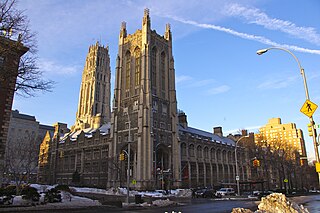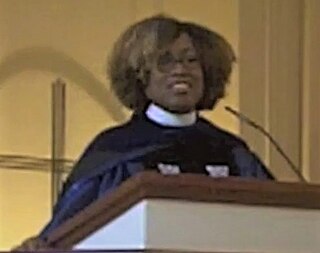
Womanism is a term originating from the work of African American author Alice Walker in her 1983 book In Search of Our Mothers' Gardens,denoting a movement within feminism,primarily championed by Black feminists. Walker coined the term "womanist" in the short story Coming Apart in 1979. Her initial use of the term evolved to envelop a spectrum of issues and perspectives facing black women and others.

John Boswell Cobb Jr. is an American theologian,philosopher,and environmentalist. He is often regarded as the preeminent scholar in the field of process philosophy and process theology,the school of thought associated with the philosophy of Alfred North Whitehead. Cobb is the author of more than fifty books. In 2014,Cobb was elected to the prestigious American Academy of Arts and Sciences.
Womanist theology is a methodological approach to theology which centers the experience and perspectives of Black women,particularly African-American women. The first generation of womanist theologians and ethicists began writing in the mid to late 1980s,and the field has since expanded significantly. The term has its roots in Alice Walker's writings on womanism. "Womanist theology" was first used in an article in 1987 by Delores S. Williams. Within Christian theological discourse,Womanist theology emerged as a corrective to early feminist theology written by white feminists that did not address the impact of race on women's lives,or take into account the realities faced by Black women within the United States. Similarly,womanist theologians highlighted the ways in which Black theology,written predominantly by male theologians,failed to consider the perspectives and insights of Black women. Scholars who espouse womanist theology are not monolithic nor do they adopt each aspect of Walker's definition. Rather,these scholars often find kinship in their anti-sexist,antiracist and anti-classist commitments to feminist and liberation theologies.
Women as theological figures have played a significant role in the development of various religions and religious hierarchies.
Marjorie Hewitt Suchocki is an author and United Methodist professor emerita of theology at Claremont School of Theology. She is also co-director of the Center for Process Studies at Claremont.

Mark Juergensmeyer is an American sociologist and scholar specialized in global studies and religious studies,and a writer best known for his studies on comparative religion,religious violence,and global religion. He is Distinguished Professor Emeritus of Sociology and Global Studies at the University of California,Santa Barbara,and William F. Podlich Distinguished Fellow and Professor of Religious Studies at Claremont McKenna College.

Katie Geneva Cannon was an American Christian theologian and ethicist associated with womanist theology and black theology. In 1974 she became the first African-American woman ordained in the United Presbyterian Church (USA).

Jacquelyn Grant is an American theologian,a Methodist minister. Alongside Katie Cannon,Delores S. Williams,and Kelly Brown Douglas,Grant is considered one of the four founders of womanist theology. Womanist theology addresses theology from the viewpoint of Black women,reflecting on both their perspectives and experience in regards to faith and moral standards. Grant is currently the Callaway Professor of Systematic Theology at the Interdenominational Theological Center in Atlanta.
Marcia Y. Riggs is an American author,the J. Erskine Love Professor of Christian Ethics,and the Director of ThM Program at Columbia Theological Seminary,a womanist theologian,and a recognized authority on the black woman’s club movement of the nineteenth century. She was one of six Luce Scholars named by the Association of Theological Schools in the United States and Canada (ATS) and The Henry Luce Foundation,Inc. as Henry Luce III Fellows in Theology for 2017-2018.

Delores Seneva Williams was an American Presbyterian theologian and professor notable for her formative role in the development of womanist theology and best known for her book Sisters in the Wilderness:The Challenge of Womanist God-Talk. Her writings use black women's experiences as epistemological sources,and she is known for her womanist critique of atonement theories. As opposed to feminist theology,predominantly practiced by white women,and black theology,predominantly practiced by black men,Williams argued that black women's experiences generate critical theological insights and questions.
Emilie Maureen Townes is an American Christian social ethicist and theologian. She was Dean,E. Rhodes,and Leona B. Carpenter Professor of Womanist Ethics and Society at the Vanderbilt University Divinity School. Townes was the first African-American woman to be elected president of the American Academy of Religion in 2008. She also served as the president of the Society for the Study of Black Religion from 2012–2016.
Renita J. Weems is an American Protestant biblical scholar,theologian,author and ordained minister. She is the first black woman to earn a Ph.D. in Old Testament studies in the United States. She was influenced by the movement in the last half of the 20th century which argues that context matters and shapes our scholarship and understanding of truth. She is best known for her contribution to womanist theology,feminist studies in religion and black religious thought. She is recognized as one of the first scholars to bring black women's ways of reading and interpreting the Bible into mainstream academic discourse. In 1989 she received a Ph.D. in Old Testament/Hebrew Bible studies from Princeton Theological Seminary making her the first African American woman to earn a Ph.D. in the field. Her work in womanist biblical interpretation is frequently cited in feminist theology and womanist theology.
Dianne Marie Stewart is Samuel Candler Dobbs Professor of Religion and African American Studies at Emory University. Dr. Stewart's work focuses on religion,culture and African heritage in the Caribbean and the Americas as well as womanist religious thought and praxis. Dianne M. Stewart is the author of Three Eyes for the Journey:African Dimensions of the Jamaican Religious Experience (Oxford University Press,2005),Black Women,Black Love:America’s War on African American Marriage and Obeah,Orisa and Religious Identity in Trinidad,Volume II,Orisa:Africana Nations and the Power of Black Sacred Imagination.
Mitzi J. Smith is an American biblical scholar who is J. Davison Philips Professor of New Testament at Columbia Theological Seminary. She is the first African-American woman to earn a PhD in New Testament from Harvard. She has written extensively in the field of womanist biblical hermeneutics,particularly on the intersection between race,gender,class,and biblical studies. She considers her work a form of social justice activism that brings attention to unequal treatment of marginalized groups.
Cheryl A. Kirk-Duggan is an African-American womanist theologian,professor,author,poet,and an elder in the Christian Methodist Episcopal Church. She is Professor-Emerita of Religion and Women's Studies and Director of Women's Studies at Shaw University Divinity School. She is the author or editor of numerous books,including the volume Women and Christianity in a series on Women and Religion in the World,published by Praeger.

Wilda C. Gafney,also known as Wil Gafney,is an American biblical scholar and Episcopal priest who is the Right Rev. Sam B. Hulsey Professor of Hebrew Bible at Brite Divinity School of Texas Christian University in Fort Worth,Texas. She is specialist in womanist biblical interpretation,and topics including gender and race.
Sarojini Nadar is a South African theologian and biblical scholar who is the Desmond Tutu Research Chair in Religion and Social Justice at the University of the Western Cape.
Fulata Lusungu Mbano Moyo is a Malawian systematic and feminist theologian who is an advocate for gender justice. Moyo has written over twenty-eight journal articles.
Debra Mubashshir Majeed was an American religious historian,activist and womanist.
Karen Baker-Fletcher is an American theologian and professor notable for her womanist scholarship,particularly on the crucifixion and resurrection. She is currently Professor of Systematic Theology at Southern Methodist University's Perkins School of Theology in Dallas,Texas.







